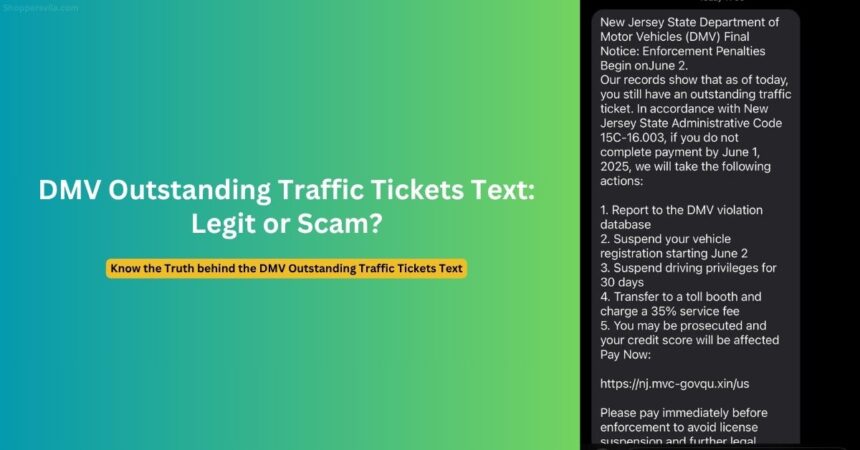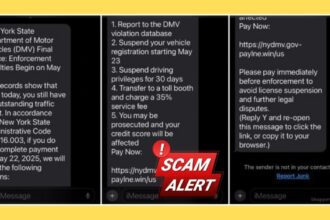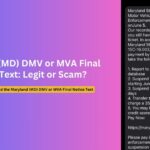A sophisticated text message scam claiming to be from state Departments of Motor Vehicles (DMV) is sweeping across America, targeting drivers with fraudulent “outstanding traffic tickets” that demand immediate payment to avoid severe penalties. This DMV Outstanding Traffic Tickets Text Scam has been documented in Virginia, California, Florida, Texas, New York, Pennsylvania, Illinois, Tennessee, Georgia, North Carolina, Ohio, Michigan, Arizona, Washington, Colorado, and dozens of other states, representing one of the most widespread government impersonation fraud campaigns ever recorded.
What makes this DMV Traffic Tickets Text particularly dangerous is its sophisticated use of official-sounding language, fake legal references, and state-specific adaptations that make the messages appear legitimate at first glance. The criminals behind this operation demonstrate advanced knowledge of government procedures while making critical errors that expose their fraudulent nature to informed recipients.
The scam exploits Americans’ universal experience with traffic violations and DMV procedures, creating urgent scenarios that bypass normal skepticism and prompt immediate compliance with criminal demands. By threatening license suspension, vehicle impoundment, and legal prosecution, the scammers create psychological pressure designed to prevent victims from taking time to verify the legitimacy of their claims through official channels.
Recent analysis reveals this DMV Outstanding Traffic Tickets Text Scam is part of a coordinated international criminal enterprise that has been systematically targeting Americans since early 2024, evolving from simple toll road impersonation to comprehensive government fraud operations that now encompass multiple agencies and violation types across all 50 states.
Overview of the DMV Outstanding Traffic Tickets Text Scam
The DMV Outstanding Traffic Tickets Scam Text represents a sophisticated evolution in government impersonation fraud, systematically targeting drivers across all 50 states with fraudulent messages claiming they have unpaid traffic violations requiring immediate payment. This criminal operation demonstrates unprecedented scale and coordination, adapting generic fraud templates for state-specific deployment while maintaining consistent underlying criminal methodologies.
Intelligence analysis reveals this is likely an international operation, with documented cases showing messages originating from foreign phone numbers, particularly Philippines (+63) and UK (+44) country codes. The criminals deploy industrial-scale text messaging systems capable of reaching millions of potential victims simultaneously, relying on statistical probability to deliver fraudulent messages to actual drivers who may have legitimate concerns about traffic violations.
The DMV Traffic Tickets Text Scam has been documented across diverse geographic and demographic targets, including Virginia DMV impersonation, California DMV fraud, Florida DMV scams, Texas DMV deception, New York State DMV fraud, Pennsylvania DMV impersonation, Illinois DMV scams, Tennessee DMV fraud, Georgia DMV deception, North Carolina DMV impersonation, Ohio DMV scams, Michigan DMV fraud, Arizona DMV deception, Washington State DMV scams, Colorado DMV impersonation, and similar operations in Nevada, Oregon, Utah, New Mexico, Louisiana, Alabama, Mississippi, South Carolina, Kentucky, West Virginia, Maryland, Delaware, New Jersey, Connecticut, Rhode Island, Massachusetts, Vermont, New Hampshire, Maine, Alaska, Hawaii, Idaho, Montana, Wyoming, North Dakota, South Dakota, Nebraska, Kansas, Oklahoma, Arkansas, Iowa, Minnesota, Wisconsin, Indiana, and Missouri.
What distinguishes this DMV Outstanding Traffic Tickets Text Scam from simpler fraud attempts is the criminals’ sophisticated understanding of legitimate government processes, legal terminology, and penalty structures. They incorporate authentic-sounding references to administrative codes, enforcement procedures, and consequences that drivers recognize from legitimate DMV experiences, creating an illusion of authority that helps bypass initial skepticism.
The financial impact extends far beyond immediate monetary theft. Victims who provide personal information face ongoing risks of identity theft, unauthorized account access, and credit damage that can persist for years. The Federal Trade Commission reports that government impersonation scams, including the DMV Outstanding Tickets Text Scam, cost Americans hundreds of millions of dollars annually, with the problem growing as criminals refine their tactics and expand their targeting.
The persistence of this DMV Traffic Tickets Text campaign, continuing for over a year despite widespread law enforcement attention and media coverage, indicates substantial financial returns that justify continued criminal investment in new tactics and expanded state-specific targeting. This suggests Americans should expect the DMV Outstanding Traffic Tickets Text fraud to continue evolving and expanding rather than diminishing over time.
The geographic scope demonstrates the criminals’ ability to research and adapt to different state DMV structures, procedures, and terminology while maintaining efficient mass-deployment capabilities. However, their use of generic templates without thorough state-specific research creates consistent vulnerabilities that informed citizens can exploit to protect themselves from this DMV Outstanding Traffic Tickets fraud text.
How the Scam Works
The DMV Outstanding Traffic Tickets Text Scam operates through a sophisticated multi-stage criminal process designed to exploit human psychology, impersonate government authority, and prevent victims from conducting proper verification before providing sensitive information or making payments to criminal organizations.
Stage 1: Nationwide Target Acquisition and Database Creation
Criminals obtain phone numbers through comprehensive acquisition methods including large-scale data breaches, social media scraping operations, purchased consumer databases, and automated generation targeting area codes from all 50 states. They create massive databases categorized by state and region, enabling simultaneous deployment of the DMV Outstanding Traffic Tickets Text Scam across Virginia, California, Florida, Texas, New York, Pennsylvania, Illinois, Tennessee, Georgia, North Carolina, Ohio, Michigan, Arizona, Washington, Colorado, and other targeted states.
Stage 2: State-Specific Template Adaptation and Authority Impersonation
The criminals adapt generic DMV Traffic Tickets Text Scam templates for each state, researching basic DMV structures and terminology to create state-specific versions. However, their research is often superficial, leading to critical errors such as referencing non-existent agencies (like “Pennsylvania DMV” when Pennsylvania uses PennDOT) or mixing legal codes from different states, creating vulnerabilities that informed recipients can identify.
Stage 3: Psychological Manipulation and Urgency Manufacturing
The DMV Outstanding Traffic Tickets Text Scam creates artificial urgency through extremely tight deadlines—typically 12 to 48 hours—claiming that immediate action is required to avoid severe penalties. This psychological pressure is designed to prevent victims from taking time to verify the communication through official state DMV websites, contact legitimate customer service numbers, or consult with family members who might identify the fraud.
Stage 4: Fear-Based Compliance and Authority Exploitation
The scammers exploit multiple psychological pressure points by threatening consequences that would significantly disrupt victims’ daily lives: driver’s license suspension, vehicle registration cancellation, court proceedings, legal prosecution, credit score damage, and vehicle impoundment. These threats leverage Americans’ dependence on driving for work, family responsibilities, and daily activities, creating maximum motivation for immediate compliance.
Stage 5: Technical Deception and Website Infrastructure
When victims click provided links, they’re redirected to sophisticated fake websites that closely mimic official state DMV portals. These sites employ professional design elements, state seals, convincing formatting, and secure connection indicators to create an illusion of legitimacy. The sites are typically hosted on international servers using deceptive domain names that appear official but use suspicious extensions revealing their fraudulent nature.
Stage 6: Comprehensive Information Harvesting and Financial Exploitation
The fake DMV websites request extensive personal and financial information under the guise of “resolving” the fake traffic violation. This includes full names, addresses, driver’s license numbers, Social Security numbers, complete credit card information, and sometimes bank account details. The criminals use this information for immediate financial fraud, long-term identity theft, and selling comprehensive victim profiles to other criminal organizations.
Stage 7: Ongoing Criminal Operations and Network Expansion
Once criminals obtain victim information through the DMV Outstanding Traffic Tickets Text Scam, they initiate multiple exploitation vectors including unauthorized financial transactions, accessing victims’ legitimate government accounts, and expanding their criminal networks through victim referrals and information sharing. The comprehensive nature of collected data enables sophisticated long-term criminal operations that may not be discovered for months or years.
Fake Text Patterns: State-Specific DMV Outstanding Tickets Message Examples
Analysis of documented DMV Outstanding Traffic Tickets Text Scam cases across multiple states reveals consistent criminal patterns adapted for different jurisdictions:
Example 1: Virginia State DMV Outstanding Traffic Tickets Fake Text
Virginia State Department of Motor Vehicles (DMV) Final Notice:
Enforcement Penalties Begin on June 2.
Our records show that as of today, you still have an outstanding
traffic ticket. In accordance with Virginia State Administrative
Code 15C-16.003, if you do not complete payment by June 1, 2025,
we will take the following actions:
1. Report to the DMV violation database
2. Suspend your vehicle registration starting June 2
3. Suspend driving privileges for 30 days
4. Transfer to a toll booth and charge a 35% service fee
5. You may be prosecuted and your credit score will be affected
Pay Now: https://virginia.gov-dgvl.xin/pay
Please pay immediately before enforcement to avoid license
suspension and further legal disputes.
(Reply Y and re-open this message to click the link, or copy
it to your browser.)
Example 2: California DMV Outstanding Traffic Tickets Fake Text
California Department of Motor Vehicles – URGENT VIOLATION NOTICE
Driver License Status: PENDING SUSPENSION
Outstanding Citation: Traffic Code Violation
Amount Due: $185.00 + $45.00 processing fee
California Vehicle Code Section 40508 requires immediate
resolution. Failure to comply within 24 hours will result in:
• Automatic license suspension
• Vehicle registration hold
• Court appearance mandate
• Additional penalty assessments
Secure payment portal: https://ca-dmv.gov-secure.win/urgent
Customer Service: +63 945 XXX XXXX
Reference #: CA-2025-VT-8847
Example 3: Texas DMV Outstanding Traffic Tickets Fake Text
Texas Department of Motor Vehicles – Final Enforcement Notice
IMMEDIATE ACTION REQUIRED – OVERDUE CITATION
Violation: Moving Traffic Violation
Citation Number: TX-2025-4471
Original Fine: $125.00
Late Penalties: $75.00
TOTAL DUE: $200.00
Texas Transportation Code 543.009 mandates resolution
before June 3, 2025 or face:
1. Driver license revocation
2. Vehicle impoundment authorization
3. Credit bureau reporting
4. Criminal prosecution referral
Emergency payment: https://texas.gov-enforcement.vip/emergency
Reply URGENT for immediate assistance
Example 4: Multi-State Generic DMV Outstanding Traffic Tickets Fake Text
[Your State] DMV – Traffic Violation Enforcement Division
WARNING: Outstanding citation requires immediate resolution
Case ID: [State Code]-2025-VT-[Random Number]
Violation Amount: $95.00
Administrative Fees: $35.00
Late Charges: $40.00
TOTAL: $170.00
State regulations require payment within 18 hours to avoid:
✓ License suspension processing
✓ Vehicle registration cancellation
✓ Collection agency referral
✓ Court-ordered penalties
Resolve immediately: https://[state].gov-dmv-pay.win/resolve
Questions: +44 20 XXXX XXXX
Critical Red Flags in DMV Outstanding Traffic Tickets Fake Text Examples:
- Fake legal codes (mixing codes from different states)
- International phone numbers (+63 Philippines, +44 UK)
- Suspicious domains (.xin, .win, .vip extensions instead of .gov)
- Impossible penalties (“Transfer to toll booth” makes no legal sense)
- Immediate deadlines (12-48 hours vs. legitimate 30+ day periods)
- Reply instructions (“Reply Y” to confirm receipt)
- Generic formatting easily adaptable across states
Red Flags: How to Identify the Scam
Several immediate warning signs can help drivers across all states identify the DMV Outstanding Traffic Tickets Text Scam:
1. Communication Method Verification
| Legitimate DMV Communications | DMV Outstanding Traffic Tickets Text Fraud |
|---|---|
| Official mail to registered address | Unsolicited text messages |
| .gov domain websites | Suspicious .win, .vip, .xin domains |
| State-specific phone numbers | International phone numbers |
| Professional letterhead and seals | Generic text formatting |
Real DMVs communicate through official mail and verified government websites, never through unsolicited text messages.
2. Geographic and Jurisdictional Red Flags
- Wrong agency references: Some states don’t use “DMV” terminology
- Mixed legal codes: References to laws from different states
- Generic state references: Vague “[Your State]” instead of specific names
- Impossible jurisdiction: DMVs don’t handle toll violations or court prosecutions
3. Technical and Domain Analysis Warning Signs
- Foreign domain extensions: .xin, .win, .vip instead of official .gov
- URL shorteners: Legitimate DMVs use full official domain names
- Suspicious subdomains: “secure-payment” or “enforcement” prefixes
- International hosting: Servers located outside the United States
4. Content and Language Red Flags
- Urgent deadlines: Real DMV notices provide 30+ days, not 12-48 hours
- Threatening tone: Official communications are professional, not intimidating
- Generic violation details: No specific location, date, officer, or violation code
- Impossible penalties: Mixing DMV, court, and toll authority actions inappropriately
5. Legal and Procedural Inconsistencies
- Mixed authority claims: DMVs don’t prosecute, courts don’t suspend licenses directly
- Process violations: Threatening immediate action without proper legal procedures
- Payment method demands: Real DMVs don’t request credit cards via text links
- Contest option absence: Legitimate violations always provide appeal procedures
6. State-Specific Knowledge Gaps
- Pennsylvania: References “PA DMV” (doesn’t exist – uses PennDOT)
- Illinois: References “Illinois DMV” (uses Secretary of State)
- Tennessee: Claims toll violations (Tennessee has no toll roads)
- Generic terminology: Using “DMV” for states with different agency structures
How to Protect Yourself from the Fraudulent DMV Outstanding Traffic Tickets Text
Implementing comprehensive protection strategies can safeguard against the DMV Outstanding Traffic Tickets Text Scam targeting residents across all states:
1. Verify Through Official State DMV Channels
- State-specific verification: Contact your actual state DMV using verified phone numbers
- Official websites: Visit legitimate .gov domains for your specific state
- In-person verification: Visit actual DMV offices for complex concerns
- Driving record checks: Use official state systems to verify actual violations
2. Understand Legitimate DMV Procedures by State
- Virginia DMV: Official communications through mail and dmv.virginia.gov
- California DMV: Legitimate notices via dmv.ca.gov and official mail
- Florida DMV: Real communications through flhsmv.gov
- Texas DMV: Official procedures via txdmv.gov
- New York DMV: Legitimate processes through dmv.ny.gov
- All other states: Check your specific state’s official DMV website
3. Implement Digital Security Best Practices
- Bookmark official sites: Save legitimate state DMV websites to avoid typing errors
- Use verified apps: Download only official state DMV apps from verified sources
- Enable security features: Protect devices with strong authentication methods
- Monitor accounts: Regularly check financial and government account activity
4. Educational Awareness and Community Protection
- Stay informed: Follow state attorney general and consumer protection alerts
- Family education: Ensure all household members understand DMV Outstanding Traffic Tickets Text Scam tactics
- Community sharing: Discuss scam awareness in neighborhood and social groups
- Elder protection: Provide extra guidance to elderly family members targeted by scams
5. Financial and Identity Security Measures
- Account monitoring: Check bank and credit card statements for unauthorized activity
- Credit surveillance: Monitor credit reports for signs of identity theft
- Fraud alerts: Place temporary alerts if you suspect information compromise
- Strong authentication: Use unique, complex passwords for all financial and government accounts
What to Do If You Receive the Scam Texts
If you receive a suspicious text claiming to be from your state DMV about outstanding traffic tickets, take these immediate protective steps:
1. Immediate Response Protocol
- Do not click any links provided in the DMV Outstanding Traffic Tickets Text Scam message
- Do not reply to the message, even with “STOP” or questions
- Do not call any phone numbers included in the fraudulent text
- Take a screenshot for documentation and reporting purposes
- Do not share the message with others (this can spread the scam)
2. State-Specific Verification Steps
- Check official state DMV records: Visit your state’s legitimate DMV website
- Contact verified customer service: Use official phone numbers from government websites
- Review actual driving history: Check your official driving record through legitimate channels
- Verify recent driving activities: Consider locations where you might have received actual violations
3. Comprehensive Reporting Procedures
- Federal Trade Commission: Report at reportfraud.ftc.gov or call 1-877-FTC-HELP
- FBI Internet Crime Complaint Center: File detailed complaint at www.ic3.gov
- State Attorney General: Contact your state’s consumer protection division
- Phone carrier: Forward message to 7726 (SPAM) and use “Report Junk” features
- Local law enforcement: File reports if you’ve suffered financial losses
4. If You’ve Already Responded to the Text
If you’ve clicked links or provided information:
- Change all passwords: Update financial and government account passwords immediately
- Contact financial institutions: Alert banks and credit card companies about potential fraud
- Monitor all accounts: Watch for unauthorized transactions or new account openings
- Credit report surveillance: Obtain free credit reports and monitor for identity theft
- Security freezes: Place temporary freezes on credit files to prevent new account openings
- Document everything: Keep detailed records of all protective actions taken
5. Long-term Protection and Recovery
- Ongoing monitoring: Continue surveillance of accounts and credit reports for months
- Identity theft resources: Utilize FTC identity theft recovery guidance
- Official communication preferences: Update legitimate DMV accounts for preferred contact methods
- Scam education updates: Stay informed about evolving DMV Outstanding Traffic Tickets Text Scam tactics
Frequently Asked Questions (FAQs)
1. Is a DMV Outstanding Traffic Tickets text message legitimate?
No, DMV Outstanding Traffic Tickets text messages are fraudulent. Legitimate state DMVs across all 50 states communicate about traffic violations through official mail sent to your registered address, not through unsolicited text messages. Whether you’re in Virginia, California, Florida, Texas, New York, Pennsylvania, Illinois, Tennessee, Georgia, North Carolina, Ohio, Michigan, Arizona, Washington, Colorado, or any other state, real DMV communications follow established procedures that include official letterhead, specific violation details, and reasonable response timeframes—never urgent text demands for immediate payment.
2. How can I verify if I actually have outstanding traffic tickets with my state DMV?
To check for legitimate traffic violations, use only official state-specific verification methods: visit your state’s official DMV website (such as dmv.virginia.gov for Virginia, dmv.ca.gov for California, flhsmv.gov for Florida, etc.), contact your state DMV directly using verified phone numbers from official government websites, visit DMV offices in person to speak with representatives, or check your official driving record through legitimate state DMV online services. Never use contact information provided in suspicious text messages, and always navigate to official government websites independently.
3. What personal information should I never provide in response to DMV Outstanding Traffic Tickets texts?
Never provide your Social Security number, driver’s license number, credit card information, bank account details, home address, date of birth, or any passwords via text message. Legitimate DMV traffic violation payments are processed through official state government systems, secure government websites, or in-person at DMV offices—never through links sent via text message. Be especially suspicious of requests for immediate electronic payments, gift card numbers, or wire transfers, as these are classic scam payment methods that legitimate DMVs never use.
4. Are there legitimate ways state DMVs might contact me about traffic violations?
Yes, legitimate DMV communications about traffic violations typically come through official mail sent to your registered address (often with official letterhead and state seals), citations issued directly by law enforcement officers during traffic stops, court summons delivered through official legal processes, or notifications when you log into your established online DMV account. However, these legitimate communications will never demand immediate payment via text message links, threaten instant license suspension without due process, or request sensitive information through unsolicited electronic messages.
5. What should I do if I’m unsure whether a DMV communication about traffic tickets is legitimate?
When in doubt about any DMV communication, always verify independently through official channels specific to your state. Do not use any contact information provided in suspicious messages. Instead, visit your state’s official DMV website directly, call verified DMV customer service numbers, visit DMV offices in person, or contact your state’s Attorney General consumer protection division for guidance. Whether you’re in Virginia, California, Florida, Texas, New York, Pennsylvania, Illinois, Tennessee, or any other state, taking time to verify through official channels is always better than risking becoming a victim of the DMV Outstanding Traffic Tickets Text Scam.
Conclusion
The DMV Outstanding Traffic Tickets Text represents one of the most sophisticated and widespread government impersonation fraud campaigns ever documented, systematically targeting drivers across all 50 states with increasingly convincing fraudulent messages. From Virginia to California, Florida to Texas, New York to Pennsylvania, Illinois to Tennessee, Georgia to North Carolina, Ohio to Michigan, Arizona to Washington, Colorado to Nevada, and every state in between, this criminal enterprise demonstrates unprecedented scale and coordination in exploiting Americans’ trust in government institutions.
What makes the DMV Outstanding Traffic Tickets Text fraud particularly dangerous is its exploitation of universal driver experiences and legitimate concerns about traffic violations. The criminals behind this operation demonstrate sophisticated understanding of government procedures, legal terminology, and psychological manipulation techniques that make their fraudulent messages increasingly difficult to distinguish from legitimate communications without proper verification.
The key to protection lies in understanding that legitimate state DMVs follow established procedures that prioritize due process over immediate compliance. Real traffic violations provide reasonable timeframes for response, clear contest procedures, and official communication channels that can be independently verified through state-specific government websites and verified contact information. They never create artificial urgency or demand immediate payment through unsolicited text messages.
As the DMV Outstanding Traffic Tickets Text Scam continues to evolve, staying informed about current tactics becomes essential for residents of Virginia, California, Florida, Texas, New York, Pennsylvania, Illinois, Tennessee, Georgia, North Carolina, Ohio, Michigan, Arizona, Washington, Colorado, and all other targeted states. The criminals adapt their approaches based on public awareness campaigns, law enforcement countermeasures, and victim response patterns, requiring ongoing education and vigilance from potential targets.
The financial and personal security impacts of falling victim to the DMV Outstanding Tickets Text Scam extend far beyond immediate monetary losses. Identity theft, compromised financial accounts, and long-term credit damage can persist for years after the initial fraud incident. Prevention through education and verification practices is far more effective than attempting to recover after becoming a victim.
Remember that regardless of your state—whether Virginia, California, Florida, Texas, New York, Pennsylvania, Illinois, Tennessee, Georgia, North Carolina, Ohio, Michigan, Arizona, Washington, Colorado, or any other—legitimate DMV agencies follow established procedures, provide reasonable timeframes for addressing issues, and maintain official communication channels that can be independently verified. When faced with unexpected traffic violation claims, always verify through official state-specific channels rather than responding to unsolicited text messages.
The persistence and nationwide scope of the DMV Outstanding Traffic Tickets Text Scam over more than a year demonstrates that Americans across all states should expect this criminal operation to continue adapting and expanding rather than diminishing. Maintaining awareness of current tactics, understanding proper state-specific verification procedures, and sharing knowledge with family and community members creates a collective defense against this sophisticated criminal enterprise.
By staying informed about evolving DMV Traffic Tickets Text Scam tactics and maintaining consistent verification practices through official state channels, drivers can protect themselves while contributing to a broader informed public that makes these criminal operations less profitable and sustainable over time.
This article incorporates analysis of documented DMV Outstanding Traffic Tickets Text fraud cases from Virginia, California, Florida, Texas, New York, Pennsylvania, Illinois, Tennessee, Georgia, North Carolina, Ohio, Michigan, Arizona, Washington, Colorado, and other states, along with official guidance from state DMVs, law enforcement agencies, and consumer protection organizations.
Stay informed about the latest DMV Outstanding Tickets Text Scam alerts, consumer protection strategies, and digital security updates with ShoppersVila.com – your trusted source for staying ahead of evolving fraud tactics and protecting your personal and financial security across all 50 states.









































